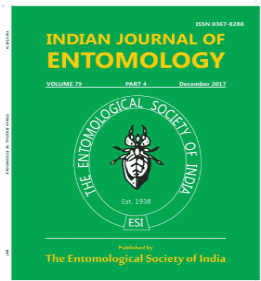Evaluation of Seed Soaking Insecticides Against Insect Pests of Sorghum
DOI:
https://doi.org/10.55446/IJE.2022.442Keywords:
Atherigona soccata, Chilo partellus, deadhearts, efficacy, Peregrinus maidis, Rhopalosiphum maidis, sorghum, seed soaking, thiamethoxamAbstract
In this study, seed soaking insecticide treatments i.e., thiamethoxam 25%WG @ 2.0 g/l, clothianidin 50%WG @ 2.0 g/ l, dinotefuron 20%SG @ 1.0 g/l, fipronil 5%SC@ 1.0 ml/l, flonicamid 50%SG @ 0.50 g/l + CaCl2 @ 2% were evaluated in sorghum variety M 35-1 during 2018 and 2019. The pooled data in terms of deadhearts (DH) showed significant reduction in damage, with least % deadhearts by the shoot fly (Atherigona soccata Rondani) (17.96%), and stem borer (Chilo partellus Swinhoe) (4.32%); while shoot bugs (Peregrinus maidis Ashmead)/ plant (5.88) and number of aphids- Rhopalosiphum maidis (Fitch.)/ 3 cm2 leaf area (23.57) were significantly reduced, along with maximum grain yield (1810 q/ ha) being with thiamethoxam.
Downloads
Metrics
Downloads
Published
How to Cite
Issue
Section
References
Balikai R A, Bhagwat V R. 2009. Evaluation of integrated pest management components for the management of shoot fly, shoot bug and aphid in rabi sorghum. Karnataka Journal of Agricultural Sciences 22(3): 532-534.
Balikai R A. 2011. Seed treatment, an eco-friendly management tactic for the suppression of insect pests in sorghum. International Journal Plant Protection 4: 381-384.
Daware D G, Bhagwat V R, Ambilwade P P, Kamble R J. 2012. Evaluation of integrated pest management components for the control of sorghum shoot pests in rabi season. Indian Journal of Entomology 74(1): 58-61.
Gahukar R T. 1991. Recent developments in sorghum entomology research. Zoological Review 4: 23-65.
Gomez K A, Gomez A A. 1984. Statistical Procedures for Agricultural Research. 2nd Edn. Wiley–Interscience New York., 680pp.
Kumar L V, Prabhuraj A. 2007. Bio-efficacy of chemicals for seed treatment against sorghum shoot fly, Atherigona soccata and shoot bug, Peregrinus maidis. Annals of Plant Protection Sciences 15: 312-315.
Kumar R, U S Tiwana. 2018. Control efficacy of different seed dressing insecticides against sorghum shoot fly, Atherigona soccata (Rondani) in forage sorghum, Sorghum bicolor (L.) Moench. Journal of Entomology and Zoology studies 6(2): 795-799.
Pawar V M, Jadhav G D, Kadam B S. 1984. Compatibility of Incol 50 S.P. with different fungicides on sorghum (CS-3541) against shoot fly (Atherigona soccata Rondani). Pesticides 18: 9-10.
Sandhu G S. 2016. Evaluation of management components against shoot fly in sorghum. Annals of Plant Protection Sciences 24: 67-70.
Sharma H C. 1985. Strategies for pest control in sorghum in India. Tropical Pest Management 31:167.
Singh B, Kumar N, Kumar H. 2017. Seasonal incidence and management of sorghum shoot fly, Atherigona soccata Rondani - a review. Forage Research 42: 218-224.
Yue B, Wilde G E, Arthur F. 2003. Evaluation of thiamethoxam and imidacloprid as seed treatments to control European corn borer and Indian meal moth (Lepidoptera: Pyralidae) larvae. Journal of Economic Entomology 96: 503-509.















